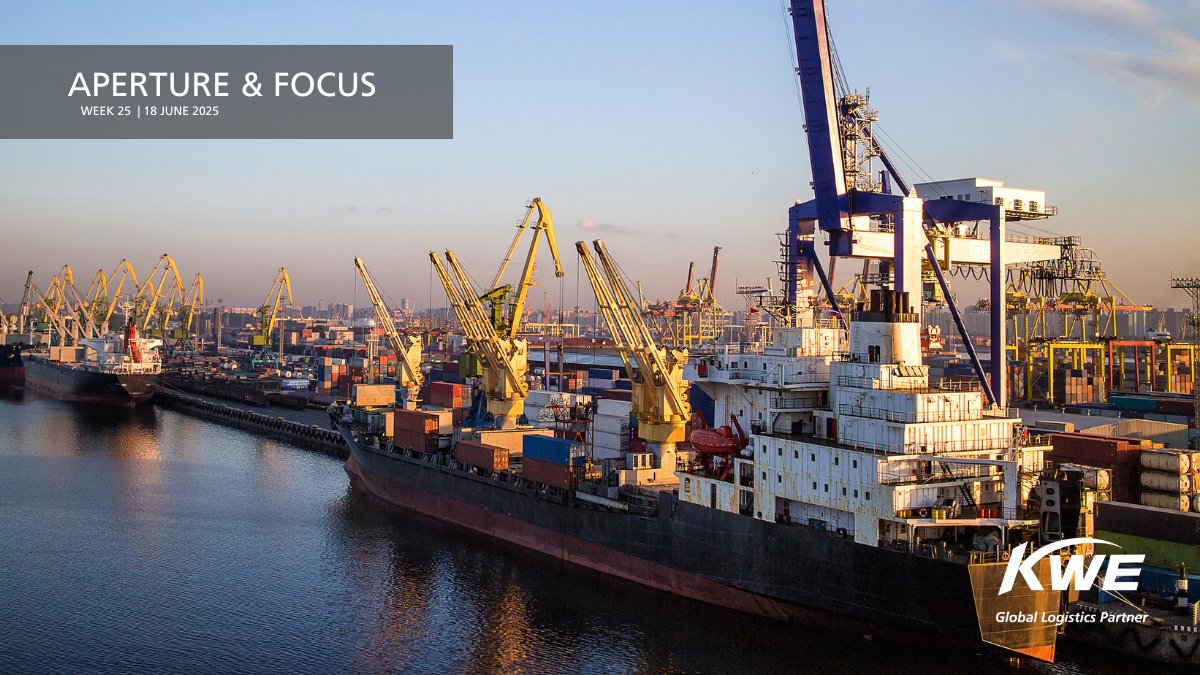Quote
Aperture & Focus 2025: Week 25

Global Aperture
On June 16th, the U.S. and U.K. signed a new trade deal at the G7 summit that lowers tariffs on British autos and aerospace goods but leaves steel negotiations unresolved. The pact reduces U.S. import duties on British cars and exempts U.K. aerospace products from a 10% levy. However, negotiations continue over quotas and tariff relief on steel and aluminum.
China announced on June 12th that it will eliminate all tariffs on exports from 53 African nations with which it maintains diplomatic relations. The initiative aims to boost trade, especially for middle-income African countries with strong manufacturing sectors, while additional support will be offered to ensure lower-income countries remain competitive.
Rising tensions in the Middle East have renewed fears of a potential closure of the Strait of Hormuz, a vital maritime route for containerized goods and energy shipments. Such a closure would force carriers to reroute vessels, adding significant transit time and worsening ongoing equipment shortages caused by ongoing Red Sea disruptions. Analysts warn this could lead to further congestion and delays on major east–west trade lanes between Asia, Europe, and North America.
Regional Focus
Americas
United States: The U.S. president signed legislation on June 12th to overturn EPA waivers that allowed California to enforce stricter clean truck standards, including the Advanced Clean Trucks and Omnibus NOx rules. California, joined by 10 other states, immediately filed a lawsuit arguing that the waivers are not subject to the Congressional Review Act—challenging what they view as an unprecedented rollback of state environmental authority.
Container volumes at the Port of Los Angeles dropped 5% year-over-year in May, ending a 10-month growth streak as new U.S. tariffs disrupted both imports and exports. Port officials warn that tariff uncertainty could increase consumer prices and disrupt holiday supply chains.
Canada: The Port of Montreal reports rising shipments to China, India, Europe, and Africa as Canadian exporters pivot away from U.S. markets due to tariffs. Port officials say the upcoming planned terminal expansion is necessary to support growth as international shipments increase and the port approaches capacity.
Mexico: Hurricane Erick is forecast to approach southern Mexico with landfall on June 18th. Ports along the coast may face operational disruptions as the storm brings heavy rain, storm surge, and potential flooding to key logistics regions.
Asia-Pacific
China: Typhoon Wutip made landfall on June 13th in southern China and moved to the coast of Vietnam as a severe tropical storm. The storm caused widespread evacuations, flight cancellations, and port closures across southern China. Authorities have mobilized rescue operations for stranded vessels amid rough seas.
Shanghai Pudong International Airport Cargo Terminal (PACTL) has joined Cargo iQ, a not-for-profit industry group supported by IATA. The move aims to enhance service reliability, tracking, and performance transparency across PACTL’s operations. It also signals the terminal’s alignment with international quality standards.
Bangladesh: Chittagong Port is facing container congestion after import deliveries dropped sharply during the Eid-ul-Azha holiday, causing a buildup of import-laden containers in the yard. As fewer importers collect their containers, yard space remains occupied, limiting the port’s ability to unload new vessels, officials warn that if deliveries don’t rebound soon, port operations and key export industries could face disruptions.
Philippines: Manila International Container Terminal has deployed the Philippines’ first electric terminal tractors to reduce emissions and improve energy efficiency. The pilot program supports ICTSI’s broader sustainability goals as it continues to modernize operations and develop infrastructure for ultra-large vessels.
Europe, Middle East & Africa
As regional tensions escalate, several countries, including Greece and the United Kingdom, have advised their flagged vessels to avoid the Red Sea unless absolutely necessary and to log all Strait of Hormuz transits as a precautionary measure. Growing security concerns following an increase of attacks on commercial ships in both waterways have prompted governments to prioritize crew safety and risk mitigation.
Germany: Frankfurt Airport (FRA) saw cargo volumes rise 4.4% year-over-year in May 2025, reaching nearly 179,000 metric tons. The increase in airfreight aligns with broader growth in aircraft movements and international passenger traffic through Frankfurt.
Belgium: Brussels Airport (BRU) will cancel all departing passenger flights on June 25th due to a nationwide strike involving security staff and other employees. Cargo handling could be disrupted if security screening or ground handling teams are impacted.
Netherlands: The Port of Rotterdam is concerned that political instability, following the collapse of the Dutch coalition government under Prime Minister Dick Schoof, may delay critical infrastructure decisions. Port officials warn that continued uncertainty could stall solutions to the country’s power grid overload and nitrogen policy gridlock.